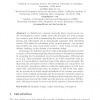Free Online Productivity Tools
i2Speak
i2Symbol
i2OCR
iTex2Img
iWeb2Print
iWeb2Shot
i2Type
iPdf2Split
iPdf2Merge
i2Bopomofo
i2Arabic
i2Style
i2Image
i2PDF
iLatex2Rtf
Sci2ools
140
click to vote
GECON
2008
Springer
2008
Springer
The Power of Preemption in Economic Online Markets
Abstract. In distributed computer networks where resources are under decentralized control, selfish users will generally not work towards one common goal, such as maximizing the overall value provided by the system, but will instead try to strategically maximize their individual benefit. This shifts the scheduling policy in such systems – the decision about which user may access what resource – from being a purely algorithmic challenge to the domain of mechanism design. In this paper we will showcase the benefit of allowing preemption in such economic online settings regarding the performance of market mechanisms by extending the Decentralized Local Greedy Mechanism of Heydenreich et al. [11]. This mechanism was shown to be 3.281-competitive with respect to total weighted completion time if the players act rationally. We show that the preemptive version of this mechanism is 2-competitive. As a by-product, preemption allows to relax the assumptions on jobs upon which this competi...
| Added | 09 Nov 2010 |
| Updated | 09 Nov 2010 |
| Type | Conference |
| Year | 2008 |
| Where | GECON |
| Authors | Lior Amar, Ahuva Mu'alem, Jochen Stößer |
Comments (0)

